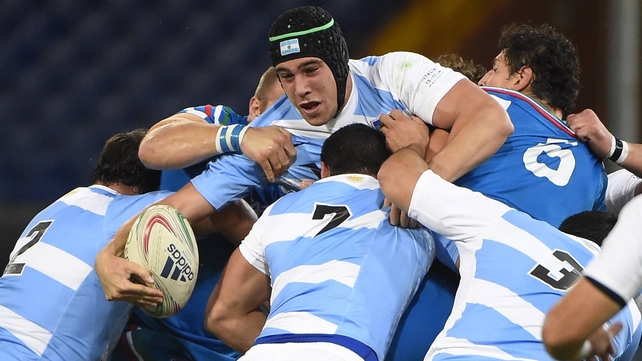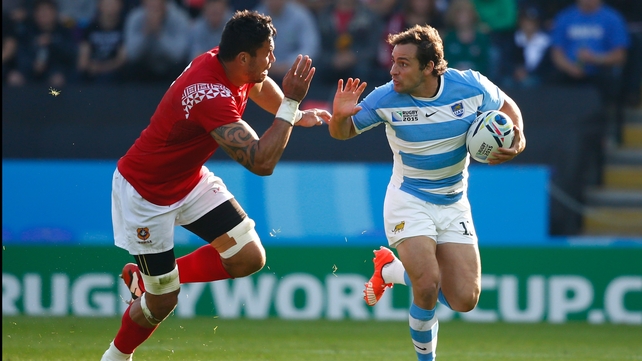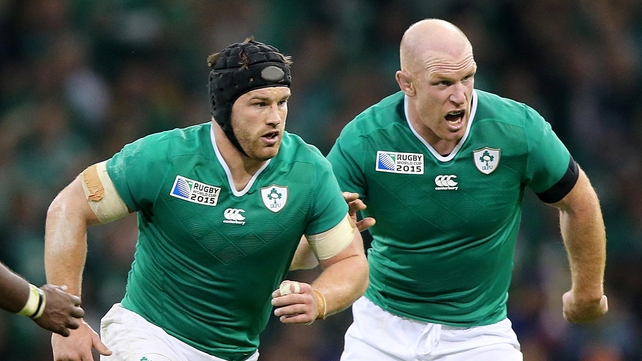Big things are happening in Argentinian rugby.
I was lucky enough to tour the country as a player in 2003 and 2005 and returned last year with FCG Grenoble as part of our pre-season preparations. We played their Test side twice as they warmed up for the Rugby Championship so I had a really good opportunity to analyse them in detail.
Rugby in Argentina is growing at an incredible rate. Their integration into the Rugby Championship has given them a proper rugby calendar.
At the elite club level just below that, Argentina will be able to repatriate their best players for a new Super rugby franchise so there is no reason why this growth should not be sustainable.
Right now, the game is still amateur at club level. We went to see a Buenos Aires Club Championship match between San Isidro and Hindu and it was like an AIL Match in Limerick in the late 90s with 6,000 people packed into a small ground. The atmosphere and talent on view was very impressive.
Agustin Pichot, the legendary Pumas scrum-half, has slipped seamlessly from playing into rugby administration.
He has put together the big sponsorship deals that they need to finance pro rugby and has also taken steps to change their coaching structures and playing style.
Because of the geographical distances involved, the amateur nature of the club game and a weak currency, Argentina have not brought in the same amount of foreign players or coaches that most other countries have.
That meant they played a very old-fashioned type of game that relied heavily on the scrum and maul.

Pichot got world class coaches like Fabien Galthie (Stade Francais), Dave Rennie (Chiefs), Jamie Joesph (Highlanders) and Graham Henry (New Zealand) to go over and coach the Argentine coaches.
Henry told them that they need to improve their skill-sets and learn to keep the ball alive in contact. He has been working with them since 2012.
As a result, the Argentinian team we face will test us very differently compared to Italy, France, Romania or Canada.
They produced what was probably the best performance of the Rugby Championship when they hammered South Africa in Durban.
For one thing, they play with a lot more width than they used to.
Instead of being an old-fashioned side, they are our first ‘Rugby Championship’ style opponent.
On that note, it is interesting that all four countries playing in that competition (SA, NZ, Australia and Argentina) are beating defenders at a higher rate than the Six Nations teams.
On an incredible 26% of their carries, the Pumas are beating a defender at this tournament. That is the highest rate in the competition.
None of the Six Nations quarter-finalists are at 20% in defender-beaten per carry. That ‘ball in hand’ style and their ability to beat defenders has seen Argentina score 22 tries already.

Opposite that, Ireland have the joint-best defence in the competition (with Australia) having only conceded 35 points over the four matches played. Les Kiss is a brilliant coach and his work this week will be crucial.
Facing width is a concern for Ireland.
The Italians changed their tactics against us and played with more width than normal and it was noticeable how passive that made us on defence.
Too frequently, you could hear through the ref mic the Irish players calling ‘hover’. That is the codeword they use when they are outnumbered and they sacrifice line speed for security.
Scotland used a similar style of attack in the World Cup warm-up match and again we struggled to get line speed and ended up defending for long periods and being too passive.
To defend against a team that plays with width it is vital that Ireland are very focused and disciplined on how many players they put in the defensive ruck. They also need to have good spacing across the defensive line.
Against the French, Ireland had it pretty easy on that score because the French attack was narrow and Ireland could simply mirror it.
Defensively the Argentinians have been missing a lot of tackles (in fact more than any of the other quarter-finalists with 105).
But while Ireland are good at scoring points when they make a linebreak, they do not make many, only doing so 1.4% of the time on carries.
Ireland’s strategy is different. It is an attacking game built on relentless pressure. It is a relatively low-risk attack that involves making a pass close to the defensive line and then high-efficiency rucking.
It tests the opposition’s discipline and fitness.
The opposite of what Argentina will look to do.
Argentina also have a strong set piece. They love to scrum and strike with their backs off powerful shoves. Against that Ireland have a really strong scrum themselves and also rarely knock the ball forward as the attack is low risk.
It is of course a different Ireland team. The injuries to Johnny Sexton, Peter O’Mahony, Paul O’Connell and Sean O’Brien’s suspension mean we lose four world class players and some great leadership.
You have to allow for the fact that whoever has come in during Schmidt’s reign has also stepped up tot the plate and performed.
"I see Papé week in week out in the Top 14 and I can assure you what Sean did is the minimum he deserved"
The rate of injuries at this World Cup is higher than and ever and its the depth of your squad now compared to your starting team which it was in the past.
It is a terrible way for Paul to finish but he will now focus on trying to help the coaching group to problem solve and strategise. I first played with Paul in 1998 when we were both selected on an Irish Colleges tour to spend a month in South Africa.
His motivational qualities are well known and he is one of the icons of Irish rugby. He was incredibly tough but very fair. I remember playing Munster in the old Thomond Park with Leinster in 2006 and I found myself loitering on the wrong side of the ruck.
In those days, ‘shoeing’ or ‘rucking’ was still allowed by the officials and I was quickly getting the treatment from seven Munster forwards’ studs. Next thing, I heard Paul shout ‘that’s enough boys’. The punishment stopped immediately.
I found myself in similar situations and saw others there too during my career, but I never saw something like that happen again. But that is because Paul O’Connell is a one-off.

I think that Sean was always going to get at least a one-match ban when you see how the disciplinary procedures have been going during the tournament.
I do think those in charge need to look at the players that provoke a reaction and those that playact when they get the response they look for.
The fact that Papé and Saint André pushed for the suspension to be harsh is very disappointing especially considering what Papé did to Jamie Heaslip in the spring (a knee in the back that fractured three vertebrae), along with the fact that Heaslip accepted his apology so gracefully.
I see Papé week in week out in the Top 14 and I can assure you what Sean did is the minimum he deserved.


